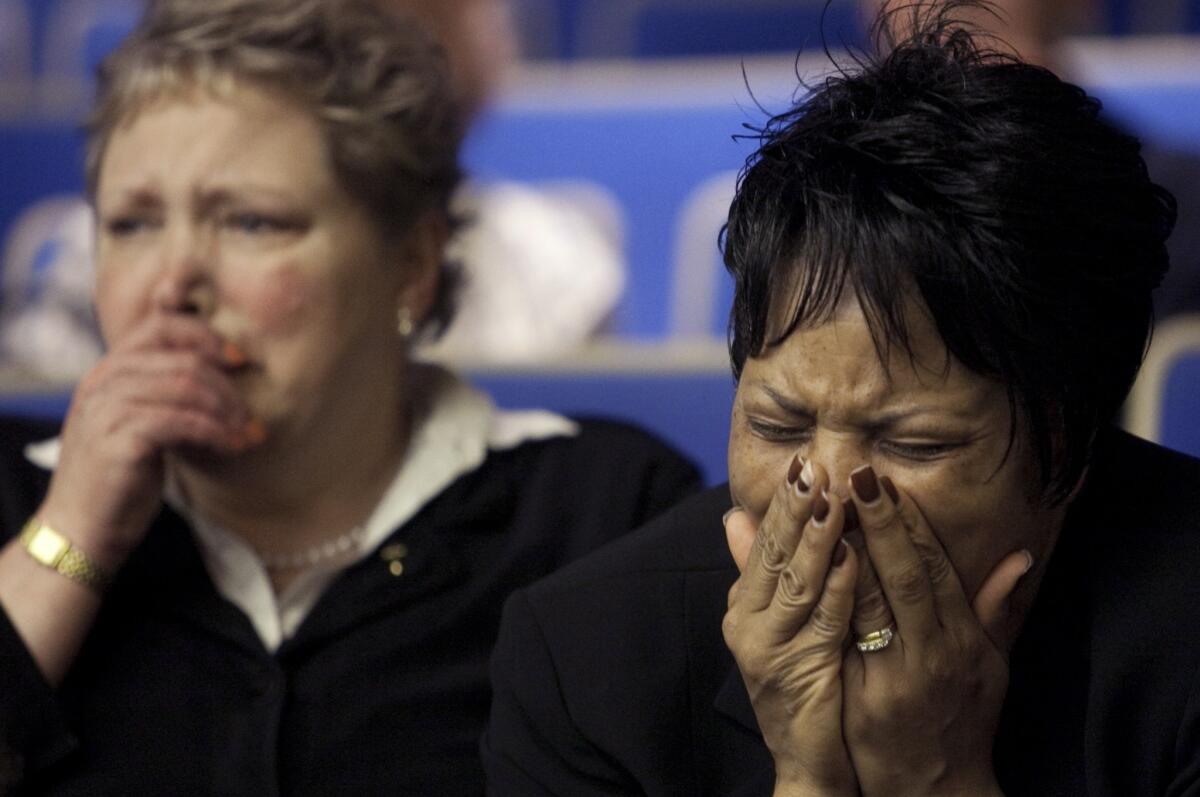Court rules Virginia Tech not liable for failed shooting warnings

WASHINGTON -- Virginia Tech cannot be held liable for failing to warn the campus and its student body that a crazed gunman was on the loose, the Virginia Supreme Court ruled Thursday, throwing out a juryâs wrongful-death verdict in the deadliest mass shooting in U.S. history.
The state justices said university officials have a legal duty to alert the student body only when they have reason to suspect a campus-wide danger. And the mass shooting that occurred on April 16, 2007, in which a gunman killed 32 and then himself, could not have been âreasonably foreseenâ in time to warn the campus, the justices said.
Last year, a jury had ruled the university was negligent in failing to warn the students, and it awarded $4 million to the parents of two young women who were killed. A state court later reduced the amount to $100,000, and Thursdayâs ruling absolves the university and the state of any liability.
A university spokesman praised the court for rejecting a âfaultyâ jury verdict. âIn the end, the cause of these heinous acts and continuing heartbreak was a troubled and angry young man with easy access to powerful killing weapons,â said Lawrence Hincker, a vice president for university relations.
The Virginia Tech shooting put colleges and universities on notice nationwide that they needed to quickly warn students of crime and violence on campus.
But the state court justices said a university and the state of Virginia cannot be held liable for a grave danger they could not have foreseen at the time.
About 8 a.m. on the day tragedy struck the campus, university officials learned a female student had been shot and killed in a dorm room. A male student in the dorm, a resident advisor, also was killed. Campus police thought they were dealing with a âdomestic dispute,â and the womanâs boyfriend was the prime suspect. And he had fled the campus, the police said.
About 9:26 a.m., the university sent a campus-wide âblast e-mailâ which reported the âshooting incidentâ at the dormitory. But the university did not warn students a gunman was on the loose because administrators thought he had fled.
Less than 20 minutes later, a gunman, later identified as Seung-hui Cho, opened fire on students in Norris Hall. Within minutes, 30 more people had been murdered, including Erin Peterson, 18, and Julia Pryde, 23. The university had sent out a second, campus-wide âblast emailâ at 9:50 a.m. warning that a âgunman is loose on campusâ and students were told to âstay in buildings until further notice.â But this warning came too late.
Cho, who was not the female studentâs boyfriend, shot himself as police closed in.
The Peterson and Pryde families did not join in an $11-million settlement paid by the university, but chose instead to sue university officials and the Commonwealth of Virginia. They alleged the university was negligent for failing to warn students in time that a gunman was on the loose.
In Thursdayâs unanimous decision, the Virginia high court agreed that a university had a âspecial relationshipâ with its students and a duty to warn them, similar to a hotel keeper and his guests. But even so, the university had a duty to warn them of dangers that were âreasonably foreseeable,â the judges said.
âBased on the limited information available [to officials] prior to the shootings in Norris Hall, it cannot be said that it was known or reasonably foreseeable that students in Norris Hall would fall victim to criminal harm,â the state court said. âUnder the facts of this case, there was no duty ... to warn students about the potential for the criminal acts by third parties.â
[For the record, 3:19 p.m. Oct. 31: An earlier version of this post said Cho killed one person in the dorm and wounded another, then killed 30 students in classrooms. Actually, he killed two students in the dorm, then killed 30 more people in classrooms, including members of the faculty. Then he killed himself.]
ALSO:
FAA to allow expanded use of electronics during flights
NSA reportedly collecting data secretly from Google, Yahoo
Are âboobiesâ lewd and disruptive? Supreme Court asked to decide
More to Read
Sign up for Essential California
The most important California stories and recommendations in your inbox every morning.
You may occasionally receive promotional content from the Los Angeles Times.










